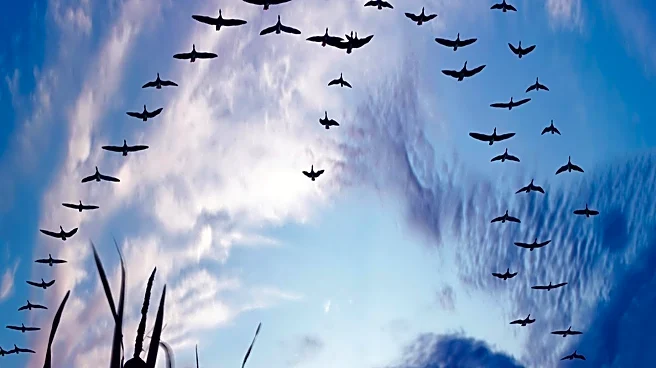What is the story about?
What's Happening?
Colorado residents are being asked to turn off unnecessary outdoor lights to aid millions of birds migrating over the state during the annual fall migration. According to BirdCast, a migration forecast tool, the peak migration period in Colorado runs from September 1 to September 24. On August 28 alone, an estimated 3.5 million birds were in flight over Colorado. Artificial lights can disorient birds, leading to collisions with buildings, which is a significant cause of bird fatalities. The Audubon Society estimates that building collisions kill up to 1 billion birds annually in the U.S. The initiative, supported by Lights Out Colorado, Dark Sky Colorado, and the Denver Audubon, encourages residents to shield outdoor lights and turn them off early during the migration season.
Why It's Important?
The initiative to dim lights is crucial for the conservation of bird populations, which face threats from urban environments. Artificial lighting disrupts their natural navigation systems, increasing the risk of fatal collisions. This effort not only aims to reduce bird mortality but also raises awareness about the impact of human activities on wildlife. By participating, residents contribute to a broader conservation effort that could help preserve biodiversity and maintain ecological balance. The success of such initiatives can influence public policy and urban planning, promoting more wildlife-friendly practices.
What's Next?
As the migration continues, organizations involved in the Lights Out Colorado initiative will likely monitor the impact of reduced lighting on bird safety. They may also engage in further educational campaigns to encourage long-term changes in lighting practices. The data collected during this period could inform future conservation strategies and potentially lead to policy recommendations for urban lighting regulations. Continued collaboration between conservation groups and local communities will be essential to sustain efforts beyond the migration season.
Beyond the Headlines
The initiative highlights the broader issue of light pollution and its effects on wildlife. It underscores the need for sustainable urban development that considers ecological impacts. This effort could inspire similar actions in other states, fostering a nationwide movement towards reducing light pollution. Additionally, it raises ethical questions about human responsibility in protecting vulnerable species and maintaining biodiversity.















